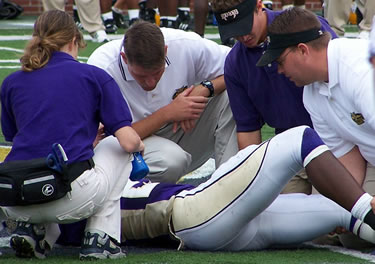Athletes prepare all year to be at their top performance when the first game of the season begins. It’s a constant battle between fatigue and conditioning to keep in shape for the season, and Jessi Webster is just one of the faces that help each and every athlete at Western Carolina University, get in shape.
Athletic trainers are there for every play of every game all season. We don’t normally think about them because they are not in the game itself, and until an injury on the field, we don’t recognize that they are there. The truth is, though, they are one of the most integral parts of the machine that we call a sports team.
Some people go through college knowing exactly what they want to do for a career. Others need to change majors during their time at school. Webster is a mixture of both of these scenarios as she went to school originally to be a physical therapist.
“I was originally a physical therapy major because my high school did not have athletic trainers. When I got hurt I went to a physical therapist and that’s what I decided I wanted to do,” said Webster.
But there was a disconnect between what she thought she wanted to do, and where she actually wanted to be in her career. “When I was in PT school, I realized I only wanted to work with the athletic population. As a PT, I would have to work with other people, and did some research and found out what it was all about and transferred. Once I started I fell in love.”
Webster has spent her entire adult life working to be where she is now. The College Park, Md. native has come from a background of athletic training dating back to 2007 when she went to Towson University. Webster got her bachelor’s degree at Towson in 2011, and then went on to get her master’s at Auburn. From there, Webster became a graduate assistant athletic trainer at Fort Benning in Columbus, Georgia, before landing at Western Carolina University. With this background, Webster knows what to look for when there is an injury on the field.
“The first thing that goes through my mind when someone on the field or court goes down is how it happened,” said Webster. “As I’m going out to the player, I’m rewinding and looking at how they went down.”
It’s a job that is not for those with a weak stomach, as there are some injuries that most would rather look away from. But Webster says that’s just something that is part of the job. Because of HIPPA laws, she can’t talk about any specific injuries, but there have been many in her time as an athletic trainer.
Webster considers herself a mom to these players both on the road and back home. She feels like a mom, but is not much older than the athletes she cares for.
“I told my mom that I have over 40 daughters during the season, because I’m the one they come to when they need something,” said Webster jokingly.
Last season with the women’s basketball team, she talked about how her day didn’t end until everyone was asleep.
“Sometimes I’ll be up until midnight making sure that everyone has what they need. Whether they have a headache or need something as simple as a bandage, I’m the one who has what they need.” This doesn’t just happen from one team, of course. It’s a round the clock job for athletic trainers, and they know that sick days are a thing of the past.
One of the most pressing issues in sports right now is concussions. It’s been seen from every single sport, and is something that is gaining increasing attention across the sports world, and its fans. Even though concussions are getting more attention, and there are certain measures being put in place to help prevent concussions, Webster reminds fans that there isn’t much that can be done once a concussion has occurred. “Even though we have ways of diagnosing and treating concussions, it’s still a swelling of the brain and nothing can help the swelling go down better than time.” She added that it takes more than the swelling to go down to get back on the field. A player has to be mentally and physically ready to do tasks, and because the trainers are with them every step of the way, Webster knows what to look for from the athletes to get them back to playing.
This school year, Webster had worked with the WCU soccer team, and is currently serving as the athletic trainer for the women’s basketball team.



